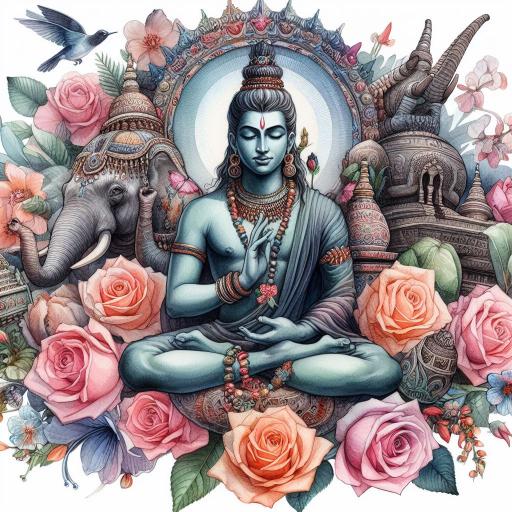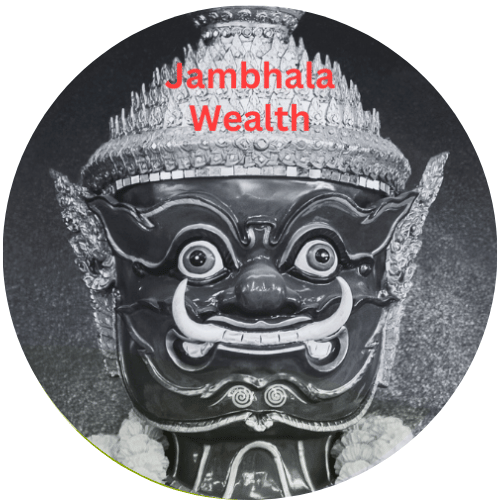Achieving Deeper Happiness Here is the PDF so you can read the article later or on a different device.

You might think of happiness as an elusive emotion that comes and goes with the wind. However, a more accurate depiction positions happiness as a state of alignment, where our soul or spirit and life resonate perfectly. It’s when how we feel inside matches the world we navigate through each day. This alignment lets us see clearly without the haze of discordant desires or forced aspirations clouding our vision.
From a Buddhist standpoint, happiness transcends mere moments of joy. It is a profound realization where all craving ceases, and the mind, often compared to a ‘wild horse’ spooked by negativity and self-doubt, finally rests. This analogy speaks volumes; when self-sincerity becomes our compass, happiness is no longer fleeting but a constant companion.
Some of us seem to be born with this alignment as if there’s such a thing as ‘happy DNA.’ But for many, happiness requires cultivating like a garden – intentionally nurturing habits and perspectives that encourage growth and well-being. It’s not about eternal bliss or uninterrupted contentment; rather, it’s engaging with life and self on a deep level that breeds true satisfaction. Self-honesty is key, so knowing yourself and your true nature – your Higher Self is important.
The Foundation of Happiness: Process Over Results
Too often, I find people chasing results as their sole means of achieving happiness. They think reaching certain milestones – a promotion, a bigger house, a larger ban balance – another tangible achievement will bring them lasting joy. But happiness isn’t just about the results; it’s about the process and the journey towards those results.

Consider the common advice to ‘stop and smell the roses.’ This isn’t just about appreciating flowers. It’s a metaphor for pausing to appreciate moments in life, an encouragement to find joy in the present rather than postponing it for future accomplishments. When fully engaged with the here and now, deeply involved with yourself and your environment, you open the door to bliss.
Mindfulness is key here, as it allows us to break the cycle of negativity that stems from a lack of self-sincerity. By being mindful, you learn to live with intention and engage authentically with your tasks, relationships, and experiences. This approach leads to a sense of happiness grounded in the process of living, not just in the milestones you pass.
By focusing on the process, you view your life and happiness as an evolving canvas rather than a checklist. This doesn’t mean you forget about your goals; it means appreciating the steps you take towards them as much as, if not more than, the achievement itself. This mindset lays a strong foundation for happiness, making it less susceptible to the ebbs and flows of life’s circumstances.
The Path to Enlightened Happiness: Seeing the True Nature of Reality
To march towards enlightened happiness, we look to the profound insight of Buddha, who taught that the greatest happiness unfolds when we perceive the true nature of reality, untouched by the layers of interpretation our minds often place upon it. This happiness comes from the understanding that exceeds our habitual thought patterns and preconceptions.
We embark on a transformative journey by training our minds to see beyond these mental constructs. This doesn’t come easy, as it requires a commitment to practices that peel back the subjective overlays we’ve formed over our lifetime. It’s a form of mental cleansing that aligns our vision with how things truly are.
Taking guidance from the ancient Greek philosopher Aristotle, who famously stated that:
‘Happiness is the meaning and purpose of life, the whole aim and end of human existence,’
we find alignment between different wisdom traditions. For Aristotle, happiness was achieved through the cultivation of virtue and the fulfilment of one’s potential.
The echoes of these teachings resonate with the ideas of modern thinkers like Ayn Rand, who declared,
‘Achievement of your happiness is the only moral purpose of your life…it is the proof and the result of your loyalty to the achievement of your values.’
Although her philosophy pivots on individualism and personal strength, it shares a common thread with Buddha and Aristotle: the conception of happiness as an intrinsic part of human existence.
The synergy between viewing reality unclouded by mental constructs and achieving one’s values points to a singular truth: happiness is the product of a well-understood and well-lived life. The next section prepares us to delve into the practical aspects of achieving such a state, particularly as an entrepreneur.
Deep Happiness in Entrepreneurship: The Four Stages of Concentration
Embarking on the entrepreneurial journey isn’t just about financial gain; it’s a pursuit that can lead us to profound happiness. As we dive into our business ventures, we encounter an opportunity for a unique form of bliss that comes through deep concentration. This bliss isn’t superficial; it is the result of aligning our actions with our deepest values and can be explained by understanding the four progressive stages of concentration.
In the first stage, we experience bliss when we successfully quiet the mind from distractions and impurities. This is when our thoughts, often scattered or negative, settle into a rhythm while we engage in our work. It’s comparable to steering a wild horse away from the fears that spook it. Once sources of stress, our tasks transform into platforms for joy and satisfaction.
The second stage moves us beyond mere bliss into a state of no mind, where peace is all that exists. In this phase, we are fully absorbed in what we’re doing. The chatter of self-doubt and the anxiety around deadlines all fade away. We are in a mode of pure creation, and it feels like our business is an extension of our being.
Following this, we find that bliss itself starts to dissipate, as stated in the third stage. This is a paradoxical concept: by losing the intense emotions of joy, we gain something far more valuable. The vanishing of bliss signals that we’re reaching a profound serenity, free from emotional turbulence.
The culmination of this journey is the fourth stage, where peace isn’t just the absence of unrest; it becomes an encompassing presence. This total peace rejuvenates and allows us to work from a place of clarity and purpose. It’s in this final stage where no mind equals deep happiness. Such tranquillity isn’t fleeting―it is the foundation for sustainable wealth and prosperity.
Cultivating Happiness: Achievable Practices for Everyday Life
The quest for happiness shouldn’t be viewed as a distant or elusive goal. It’s within reach through the simple yet profound practices we embed into our daily routines. Building on the foundation of wealth and prosperity, as mentioned in the previous sections, we can develop habits that consistently lead us toward profound contentment.
Practical, everyday actions can significantly impact our journey to happiness. Mindful engagement in our tasks, whether related to business or personal affairs, allows us to experience joy in the process. Regular reflection on our progress, accomplishments, and even setbacks reminds us of our capacity for growth and helps us appreciate our path.
Integrating these practices into everyday life need not be overwhelming. Start small, with conscious breathing or taking a moment to revel in a job well done. Gradually, these habits become second nature, forming the backbone of a deeply satisfying and happy life.
Ultimately, the richness of our happiness is measured not just by the wealth we accumulate but by the depth of our spiritual and emotional prosperity. Aristotle and Ayn Rand recognized that happiness is an end in itself—a reward for pursuing our values and a reflection of our innermost selves. This alignment of values and actions fosters an environment where happiness thrives.
Embrace the process. Happiness is more than a fleeting pleasure; it’s a profound peace that comes from within, nurtured by our everyday acts of sincerity and pure intention as we explore our essence. As we more fully engage with our life’s work and passions, we can find that deep, abiding happiness that resonates with the true nature of reality—a happiness that is both our journey and our destination.



I will be the first to admit I have no experience with meditation, which is why my life sometimes lacks focus. This article has given me something positive to think about going forward in my own life. I would be happy experience the “State of No Mind” if even for a moment. I have this site bookmarked so I may return. You have sparked interest in me. The only question I can ask is, Have these methods improved your life, or are you still on your journey to find peace?
Michael
Hello Michael. Thanks so much for being so honest.
I have been a mindfulness/meditation practitioner and teacher for many years. My life is peaceful, even blissful, and I have many strategies to deal with life’s ups and downs. Please revisit and get started.
The first step towards this empowering state is mindfulness practices. It’s easy to get started. You just need to set aside 20 minutes each day. This restful period will enhance your productivity and make you calmer and more relaxed. Happiness and Gratitude are the other two factors to graduate to when you are beginning to feel the benefits of mindful practices.
I’d love to hear how you found it.
Keep in touch.
Blessings and Success and Peace!
Linden
Hi Linden,
Mixing Buddha with Aristotle and Ayn Rand is like inviting Gandhi, Nietzsche, and Iron Man to the same dinner party—unexpected but fascinating. You’ve got us considering happiness beyond the bank balance, which is refreshing in a world obsessed with material success. But here’s a curveball for you: in a world that measures success in likes, retweets, and viral trends, how do we keep our inner compass pointing toward this happiness without getting lost in the digital noise? How do we balance the quest for inner peace with the undeniable pull of external validation?
Thank you for your work and sharing this blend of wisdom.
Best regards,
MAkhsud
Hi dear Makhsud,
Yes, I am alluding to my work on MillionaireMindsetRoadmap.com, in which I try to expose the conspiracy of full-time traditional work, so Rand and Aristotle are vital in that. Glad you’re fascinated. I’m also thrilled that I can convince you that overall happiness is SO important to fuel your Ziji , which will inject your bank balance and lead you to success. I feel that my businesses are an integral part of my life because they are growing out of my innate creativity, and my goal in developing them is my happiness.
Good ‘googly’ ball (cricket analogy – I’m British btw) question. Happiness prevails if you are connected to your inner nature, your true nature. It’s the core of your success and the most delightful state of all to be in. External validation is just a delusion, a spot beckoning you to scratch it. You are at the centre of your Universe created by all your positive ‘happy’ thoughts and gratitude, so the digital noise can be turned right down. Add to this that you are invoking the Law of Attraction so you can attract what you desire directly towards you.
Everything can be accomplished using spiritual strategies to ensure that your mental health doesn’t decline.
Hope this helps. A plethora of links!! Sorry.
Blessings and warm thanks for your stimulating comment. 🙏🏼
Linden